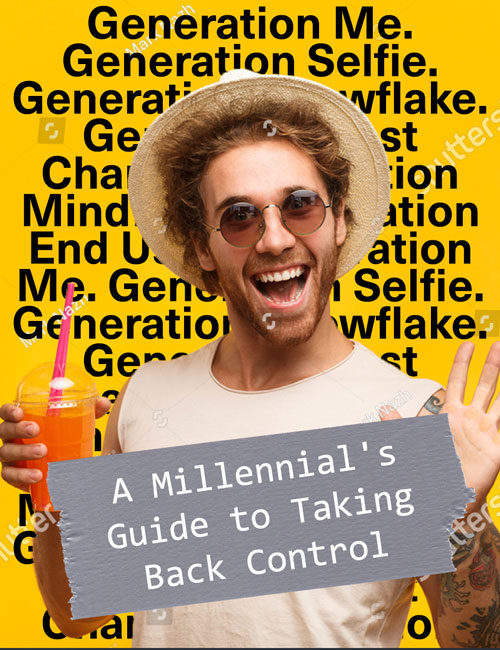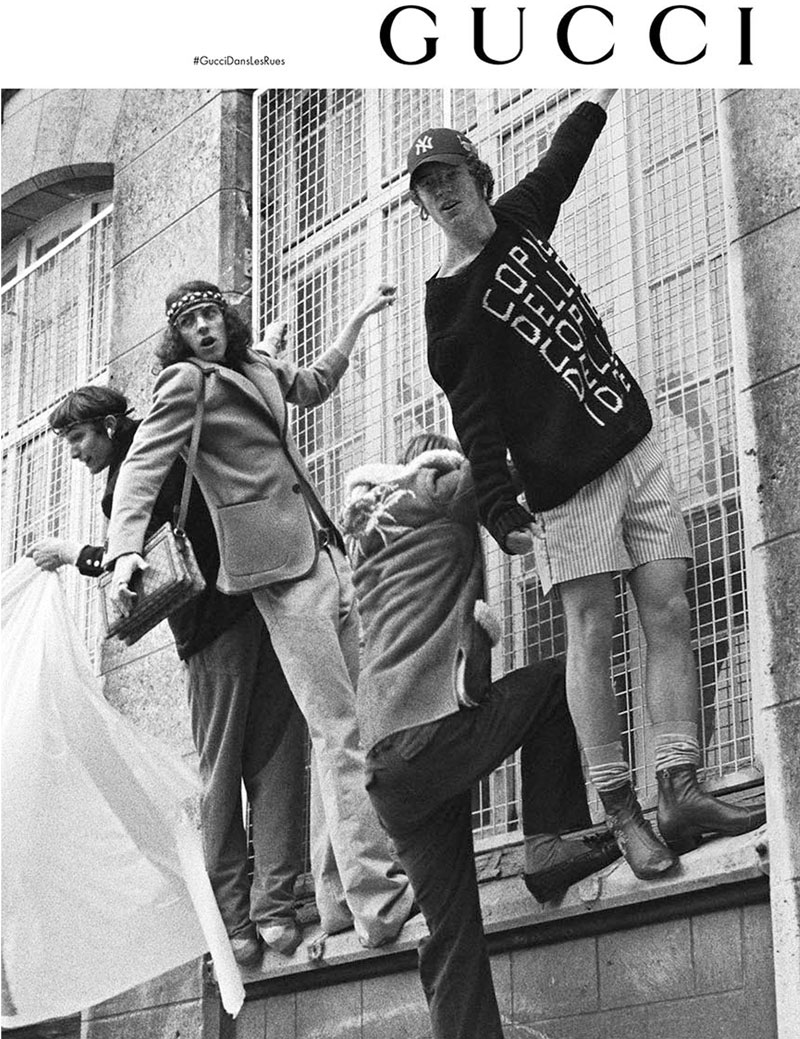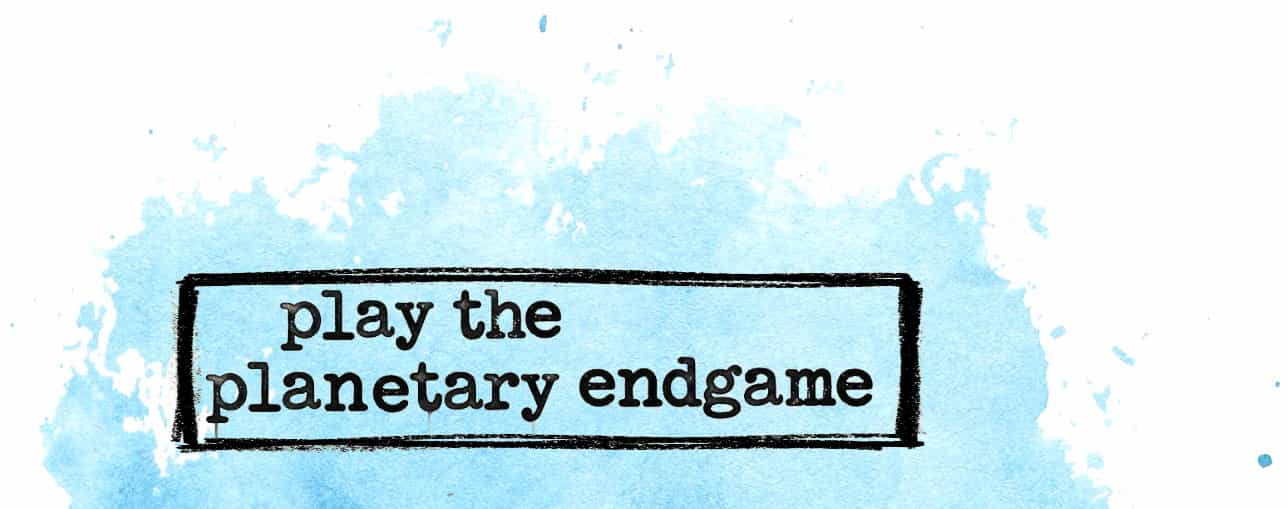A Millennial’s Guide to Taking Back Control


One minute you’re blasted on molly, snapchatting your dick-tits as Tiësto thuds in the background. Full earthquake eyes. The next you’re zoning out at some bullshit job while the world around you sinks into neoliberal quicksand.
Should have saved for a starter condo. Typical Millennial.

Millennials are the lamest of all generations, right? Too few put down their phones long enough to vote in the 2016 election, and mocking them is a supremely satisfying pastime. But, hold on: they are also the most informed and forward-looking cohort in history. They’re unafraid of change, and their lie detectors are first rate. Can millennials — the maligned generation — suddenly click, become revolutionary, and take us into uncharted territory?
I remember the first time I heard the word—Millennial. It must have been the earlyish mid-90s, because we were playing Wolfenstein 3D and listening to Nirvana.
Somewhere between the chunky sprites of Nazi blood and All Apologies, a teacher hushed the classroom and mouthed a pronouncement. We were to be known as “The Millennial Generation.”
Whoop.
To be of the Millennial Generation, we were told, was to be optimism incarnate. We belonged to the future, and it to us, and everything was coming up aces.
The pop sociologists who coined the term, Neil Howe and William Strauss, predicted that Millennials, reared under the watchful eye of helicopter parents, would establish themselves as well-behaved conformists with a bent to civic-minded altruism. In other words, a poignant rebuttal to the disaffection, atomization, and slackerdom of Gen X, with their McJobs and inexhaustible irony.In the face of creeping economic complexity, Millennials would instinctively adapt to the arcane demands of a high-tech postindustrial society. All the while being committed to building up social institutions, rather than tearing them down, like their Boomer parents.
O, to be a prelapsarian Millennial again. Things were good. Life was simple. Cartoons came on after school and you could nuke a miniature pizza in under three minutes. Soon enough, we’d all ascend to an adulthood spent telecommuting from beachside verandas, listening to jazztronica at responsible volumes on our Mini CDs.

It didn’t take long for that future to sour.
Soon after learning we were Millennials, the Millennium was upon us. That great threshold-crossing to the 2000s—the canvas onto which so much apocalyptic paint was thrown—rapidly become synonymous with paranoia, anxiety, and doom.
The first doom wave was spectral:
a phantom bug was coming to smash our world
Sometime in the mid-80s, a handful of computer scientists began wringing their hands over the possibility of a glitch occurring when the clock struck midnight on December 31, 1999.
A glitch with the capacity to end the world, as Time hyperventilated on its cover. Markets would crash. Nuclear subs would malfunction. Planes would fall from the sky.
Myopic creatures, we’d only ever recorded the year with two digits. And when that ‘99 rolled over to ‘00, they said, computers everywhere—thinking it was January 1, 1900—would go haywire. By Hallowe’en 1999, the global panic claxon of Y2K was earsplitting; the US government alone spent 100 million dollars in preparation.
That New Year’s Eve, as the ball dropped on Times Square, cops were out in force, Glocks cocked, while millions of office drones clocked overtime, staring at the blinking cursor, waiting for the world to burn.
The second wave was speculative:
fake companies crashed a fake market.
Misleading statistics. Irrational exuberance. The promise of unlimited wealth. Fuck the middlemen; we’ll sell pet food directly to the consumer!
Everyone got really excited about the internet once you could use it to buy stuff. So much so that they poured billions of dollars into a new type of venture that was so bleeding edge it didn’t need to turn a profit: the Silicon Valley startup. Then Fed chair Alan Greenspan slashed interest rates, the dot-com bubble inflated in kind, and the subsequent burst taught everyone a dread lesson. Capital tilts against those without it. And when it does, it’s average people left holding the bag.
The third wave was terrifying:
Where were you?
Achingly clear blue sky. Another teacher, another hushed classroom. This time the pronouncement on our generation was bleak. Twin 747s had struck the twin towers in spectacular flashes of light, death, and jet fuel. The Kyoto Protocol was subsequently shredded and the Coalition of the Willing began a slaughter that has yet to stop. Cue Five Eyes. Cue Katrina. Cue Kanye West, attack dogs, drooling goons, and the steady tic, tic, tic of a culture crossing the point of no return.
All of which is to say, as Millennials watched the dust settle on the 20th century, the world they inhabited—the world that had been promised them—was manifestly a paranoid and perilous place, one where the baby monitor never got turned off.
With Millennials entering their formative years, one might have expected a proper revolt, given the blood and oil being everywhere spilt. But all the good-natured optimism and tech savvy found its parasitic muse in a revitalized Silicon Valley. It was the age of platforms—MySpace, Facebook, Reddit, Twitter, Tumblr, 4chan, and more. Millennials made it possible for themselves to decamp for an alternate reality. One that ran parallel to the moral affront of the Bush years. One that they controlled.
It was the sound of velocity. Things that hadn’t existed a week ago suddenly became all-consuming. One minute you’d be stressing about who to put in your top eight. The next you’d be told that the great migration was under way—we were all abandoning MySpace for Facebook.
But you can’t even personalize your profile? Yeah, dummy, that’s the point.

Generation Me. Generation Selfie.
Generation Snowflake.
This is the point in the story where the crusty old journalists get their knives out to carve up the children. Who knew that criticizing the youth would turn out to be such a clickbait gold mine for Boomer columnists and their Gen X lackeys. Who knew there would be such glee.
They criticized Millennials for their upbringing and condemned them for their work ethic. They were lazy, shiftless, self-absorbed, narcissistic. They couldn’t get their shit together. Zero loyalty. Financially illiterate. Irritating. Just whiny little babies crying about every goddamned thing.
Sure, Millennials came of age during overlapping financial crises that saw a profound escalation in the transfer of wealth from the middle and working classes to the rich. Sure, speculation had fucked the housing market for anyone not already in it. And, sure, the cost of living in Western nations had skyrocketed while wages stagnated or declined. They would have to play a poor hand well.
True to form, Millennials went from precocious to precarious with style. If one job didn’t pay the bills, we’d get side hustles. If that didn’t do the trick, we’d drive strangers around in our cars. If it still wasn’t enough, we’d fuck each other on a livestream for loose change. And if we were still left wanting? We’d monetize our personalities and trade influence over peers for branded merch.
Of all the Millennial stereotypes, only one ever rang true—distraction. The ADHD generation, we were plagued by intermittent concentration and an inability to see the forest for the giant gun pointed at our collective face.
For all the time and emotion we poured into social media, we never looked much past the surface, so caught up were we in the dopamine tunnel of poking and following and hearting. Addicts of the convenience of constant connection, we failed to grasp how truly revolutionary was the tools in our hands.
Plug in your phone and the kinetic turns electrical. From a far-off dam or coal plant, electrons flow through a loop into substations and aluminum lines, poles and drums, the charge finally entering the knotted-up fire hazard of white plastic cords that connect your Instagram account to the now-drowned corpses of woodland caribou.
Connected. Everything is connected.
Our relationship with our tools is chiastic. Not only are we Jonah, swallowed up by the algorithmic whale, but the whale is also us, swallowing everything else.
When we begin to untangle the mess of wires in which we’re ensnared, we see the strangeness of this landscape, of our politics, ecology, and technology. Not quite nature, not quite future, but a taiga in between.

Generation Last Chance. Generation Mindfuck. Generation End User.
In the latter half of the Obama years, Millennials took a dark turn. The stereotype went from snivelling child to freelance destroyer of worlds.
Millennials bumped off Applebee’s. Gut-knifed Macy’s. Bludgeoned the McWrap. Defenestrated the focus group. Strangled Hooters. We napalmed any totem of consumer splendor within the flight pattern.
Thousands of articles, hundreds of books, dozens of movies, and several really bad sitcoms have operated under the original premise put forth by Strauss and Howe. That Millennials—by dint of youth, courage and self-sacrifice—would drag this world of laggards into a future as good as advertised. Millennials would save the day.
Their first book, Generations, was a hit. The two then combined to pioneer one of the most bullshit disciplines to ever exist: generational marketing. What they gave away in intellectual heft, they made up for in bank. The sociologists would go on to work with MTV, Nickelodeon, PepsiCo, all branches of the US military, Goldman Sachs, and even the missile-smiths at Raytheon.
Then they turned a dark corner. A Zeitgeist-probing follow-up called The Fourth Turning: An American Prophecy quickly became a Steve Bannon favourite; it predicted that within two years America would suffer a major upheaval, finally reaching a crescendo of crisis equivalent to “nature’s raging typhoon, the kind that sucks all surrounding matter into a single swirl of ferocious energy. Anything not lashed down goes flying; anything standing in the way gets flattened.”
The role Millennials will play in this crisis? The heroes, naturally.
Saviours of civil society, SJW wet blankets, avocado-on-toast enthusiasts, and sexless, rude, hedonistic, uncharitable, socialist, capitalist weirdos who refuse to support the mayonnaise industry.
That’s a lot of conflicting opinions.The topic of generations is the domain of hacks. Marketers trying to make a dirty buck by selling junk to teenagers and discourse-mongers trying to stir up enough engagement to snag a book deal.
Don’t forget: the history of Millennials is naught but the history of marketing to Millennials. The idea that everyone born between 1981 and 1996 forms a cohesive whole is pure fiction.
What does exist is a new class. It’s people who dove into student debt and were then cut out of the economy, full stop. It’s whoever has a job where they’re mere meat for an algorithm. It’s anyone who will enjoy a lesser quality of life than their parents even though they work harder.
Being a Millennial is difficult. It’s the experience of falling prey to neurocapitalism, doomed by climate change, and addicted to software that works actively against you.
It’s Juul puffs, Wikipedia wormholes, Xanax and chill. It’s being absolutely maddened that the idiots are winning and if someone doesn’t act we are going to be living in a refrigerator box under an overpass, surrounded by fascists.
It’s living within an insoluble system that responds instantly to your every impulse, down to the haptic feedback. It’s knowing that when the next recession hits, you’ll be the one on the chopping block, forced to live in a motel, desperate for any gig that facilitates a restocking of instant ramen.
It’s also to have spent your entire lifetime being told that you can change the world—and then, amazingly, to find the tool to do it in the palm of your hand. The logistics to organize, the channels to broadcast, and the weapons to wage total nonviolent war on anything or one that wants to see you stuck in their hellish timeline.
One minute you’re blasted on molly, snapchatting your dick-tits as Tiësto thuds in the background. Full earthquake eyes. The next you’re using a logistics algorithm to jam an oil company’s convoy with unwitting Fed-Ex trucks.
Typical Millennial.
Join the Third Force Collective to access our revolutionary briefings.
This isn't a paywall. You can close it if you just want to read the article below it. But our aim is to win the planetary endgame — we want to catalyze a moment of truth, a stunning reversal of perspective from which corpo-consumerist forces never fully recover. For that we need you.






